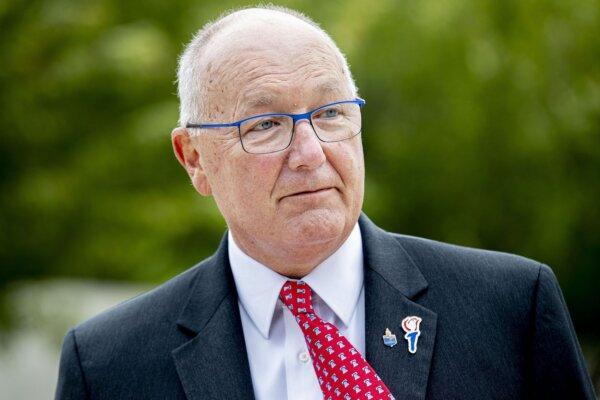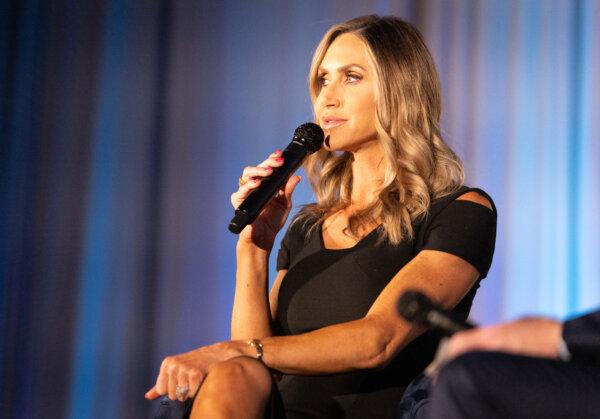On the border, trade, and more, the GOP platform sounds a whole lot like the former president.
It’s short. It’s punchy. It’s former President Donald Trump’s, courtesy of the party he leads.
“The RNC platform reads like the outline to a Donald Trump speech. It actually reads in his voice,” Richard Gordon, a member of the chairman’s board of the Democratic Governors Association, told The Epoch Times.
A Trump campaign source told The Epoch Times that the former president was looking over and modifying the document late on July 7, the night before the Republican National Committee’s platform committee passed it in an 84 to 18 vote.
Everything from the distinctive capitalization to the dedication—“to the forgotten men and women of America”—has the fingerprints of a man who decisively recaptured his party after energizing his base through contentious early primaries.
The document softened abortion-related language, an apparent concession to concerns over electability. The change has prompted pushback from some pro-life activists, including former Vice President Mike Pence and his Advancing American Freedom policy group.
Other pro-life organizations, including Catholic Vote, have defended the document.
The handling of abortion isn’t the only thing different and noteworthy about the 2024 platform.
Insiders told The Epoch Times the document is unique insofar as it is tied to a specific candidate, former President Trump, and written to reach a broad audience of Americans. Unusual aspects of the platform committee meeting have also drawn attention.
Rapid-Fire Passage
In a break with precedent, the committee meeting occurred behind closed doors and was not broadcast on C-SPAN. Multiple attendees told The Epoch Times that electronic devices were removed from the meeting after a motion to that effect was passed.
An email reviewed by The Epoch Times shows July 8 as the scheduled date for subcommittee meetings and July 9 as the scheduled date for the full meeting.
Multiple sources familiar with the proceedings described what happened on July 8. A number of speakers delivered remarks. Then, Pete Hoekstra, the chair of the Michigan Republican Party and a former ambassador to the Netherlands, made a motion to pass the platform. The subcommittees never met as the full platform quickly carried the day.

Kevin Cabrera, an attendee and member of the Miami-Dade County Commission, told The Epoch Times that the meeting’s chair, Sen. Marsha Blackburn (R-Tenn.), gave attendees the opportunity to submit proposed amendments on sheets of paper.
“No one turned in any amendments,” he said.
Gayle Ruzicka, a pro-life member of Phyllis Schlafly’s Eagle Forum, told The Epoch Times that she and others who wanted to submit amendments didn’t have time to do so. She said the vote on the platform took place too soon after attendees received the instructions to write down amendments. Ms. Ruzicka also questioned whether those present had enough time to review the platform.
“We were treated very poorly,” she said.
Mr. Cabrera defended the process. He pointed out that the platform was approved by an overwhelming margin when put to a vote.
Quick, Readable, and ‘MAGA’
At just 16 pages, with plenty of white space, the platform is a much quicker read than its predecessors. The 2016 platform ran to more than 60 pages. The 2012 platform was also lengthy. While detractors object to the sudden omissions, advocates compare it to the compendiousness of America’s founding documents—the Declaration of Independence is a short and sweet 1,320 words.
In a June 27 memo ahead of the platform committee meeting, Chris LaCivita and Susie Wiles of the Trump campaign called for a more concise party platform in line with their candidate’s vision and free of what they called “special interest influence.”
“For decades, Republicans have published textbook-long platforms that are scrutinized and intentionally misrepresented by our political opponents,” they wrote.
Jim Bopp, Jr., a Republican lawyer and veteran of past Republican platform committees, told The Epoch Times that the new platform reflects a “substantial conceptual change” from what came before.
“Historically, the Republican Party platform has been viewed to be not the instrument of the presidential nominee, but [as] the statement of principles, goals, [and] both short-term and long-term public policies we support,” he said.
“The Trump campaign has decided, and the platform committee has agreed, to change course,” he continued, likening the platform to campaign literature for the presumptive nominee, with an attendant four-year horizon.
James Campbell, a political scientist from the University at Buffalo, told The Epoch Times he doesn’t think the platform will matter as much this time around as voters can compare and contrast two presidential records.
“I think people go back to real-life experience—and they should, because a lot of the platform is public relations,” he said.
Old platforms packed in a plethora of foreign countries and peoples. The 2016 document praises the Kurds of northern Iraq, Taiwan, and even Egypt’s then-president, Abdel El-Sisi. All that and more is missing from the new platform, which does mention American dependence on China and unspecified allies in the Indo-Pacific.
A favored GOP nation, Israel, does get positively name-checked, and the threat of antisemitism and “pro-Hamas radicals” are discussed. But the document lacks extensive language, present in past platforms, affirming the party’s “unequivocal support of Israel.”
Signature Trump pledges, particularly on the border, also set the document apart. They include his vow “to carry out the largest deportation operation in American history” and for a “fentanyl blockade” by the U.S. Navy. Elsewhere, the platform echoes the former president’s call to use some federal land for “Freedom Cities” and his vow to eliminate taxes on tips.

Speaking with The Epoch Times, the former GOP politico characterized the trade-related language as “a major departure from Republican economics—Reaganomics, to be specific.”
Like Ms. Ruzicka, he objected to the omission of abortion-related language, anticipating possible minority objections at the convention.
Mr. Bopp, Jr., defended the approach to life issues in the document. The platform, he argued, is tied to former President Trump and what he can realistically do during a second term with a closely divided Senate.
“There’s no prospect in the next four years for any substantive law on abortion to be adopted. Period,” he said.
Convention Action Items
The Republican National Committee is now closer to greenlighting the platform in Milwaukee. That event will also see former President Trump go from presumptive nominee to his party’s official selection.
In correspondence with The Epoch Times, an RNC spokeswoman outlined other votes slated for the convention—which, for the most part, are action items of most interest to political junkies and active Republicans who are keeping a keen eye over technical party matters.
One vote concerns a report on who will be named the permanent delegates to the Republican National Convention, while another has to do with naming permanent convention officers. Incoming committee members will also be approved.

For all the drama surrounding the new GOP platform, most of those who spoke with The Epoch Times agreed that the gathering at Milwaukee’s Fiserv Forum is likely to go off without a hitch.
Over nine years after descending the golden escalator, former President Trump still commands the loyalty of a strong base. He now also has trusted allies in key positions within the GOP apparatus—for example, his daughter-in-law Lara Trump, who co-chairs the Republican National Committee.
“The president has the full-throated support of the Republican Party,” Mr. Holsclaw said.










